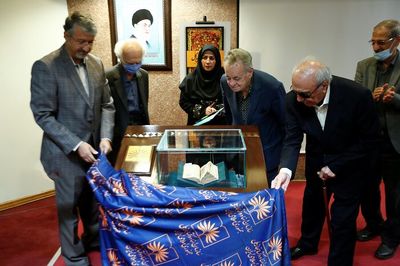The library has recently purchased the rare manuscript from a private collector, Noshad Rokni, an expert from the NLAI Committee on Rare Manuscripts, said during the unveiling ceremony of the book.
It contains 322 sheets and each page features Indian-style illuminations and 12 lines inscribed in nastaliq script.
“Compared to other rare editions the Divan of Hafez, this manuscript has a unique characteristic; other rare manuscripts do not have many illustrations, while this edition has 92 illustrations,” Rokni said.
“This book has been made of Termeh paper, which is usually vulnerable to environmental factors, however, this edition is still intact and this shows that it has been preserved properly,” he added.
“Therefore, the library can provide the opportunity for scholars to scrutinize the rare manuscript extensively,” Rokni noted.
The unveiling of the manuscript was a prelude to a program the library held on Tuesday to celebrate Hafez Day, which fell on October 12 this year.
Shams ad-Din Mohammad, the celebrated Persian lyric poet who is best known as Hafez, is commemorated every year on the 20th of Mehr on the Iranian calendar.
Hafez is most famous for his divan, and among the many partial English translations of this work are those by Gertrude Bell and H. Wilberforce Clarke.
Hassan Anvari, a permanent member of the Academy of Persian Language and Literature, was among the literati and cultural figures attended the unveiling ceremony.
In a short speech, he said that the Divan of Hafez was not compiled by the Persian poet, but Shams ad-Din Mohammad Golandam, one Hafez’s close friends, collected his poems after his death.
“Hafez is considered a mystic and this is not for the present time. A mystical interpretation has been written about his divan in the past, but, based on the poems he has left behind, he rejects this idea,” Anvari stated.
“It can be said that like philosophers, Hafez has a systematic way of thinking, because his poems contradict each other,” he added.
“He lived in the 14th century and today we live in the 21st century. There are issues today that he could never even have imagined, therefore we can never expect him to give solutions to our present-day problems,” Anvari asserted.
However, he added, “We can learn some things from Hafez, Sadi and other poets that are still practicable. For example, we can use love to build ourselves, our families and our society.”
Source:Tehran Times

